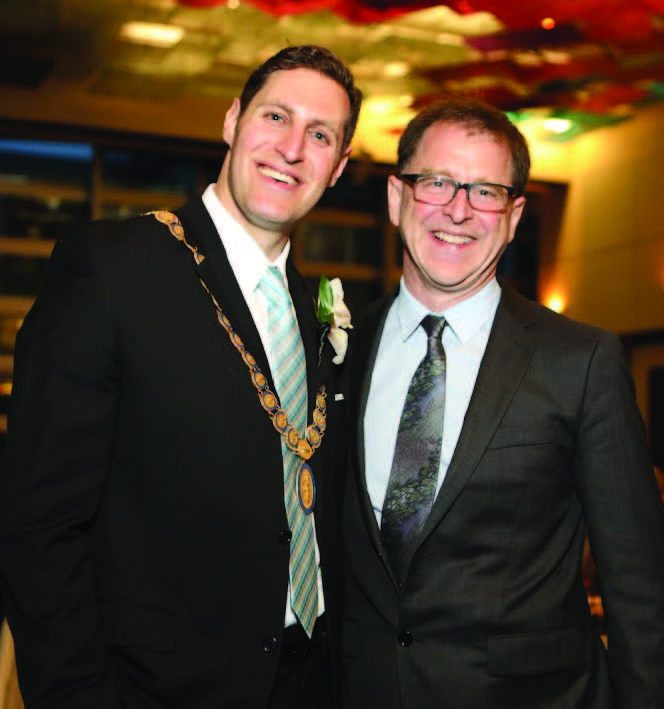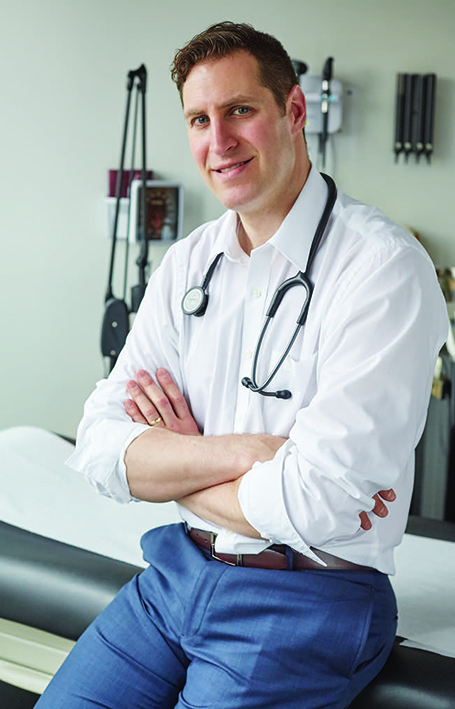Advocating for something better: Dr Eric Cadesky
Doctors of BC’s new president, Dr Eric Cadesky, talks about dealing with the difficult issues facing the medical profession with respect and collegiality. The BCMJ interviewed Dr Cadesky shortly before he became president on 2 June 2018.
Can you tell us a little about your background?
I was born and raised in Toronto, did my undergraduate degree at U of T, and then went on to study medicine at McGill; I enjoyed student life in Montreal so much that I stayed for residency in family medicine. I chose family medicine because each of my clinical rotations brought new challenges and skills that I wanted to keep as part of my future practice. I loved Montreal and learned French while I was there so that I could get the most out of my experience in and beyond medicine. The multicultural setting sparked an interest in languages and I ended up backpacking through countries like Cuba and Ecuador where I learned Spanish. Since moving to Vancouver I try to care for people in their first language, and in return they correct my grammar.
What are the greatest challenges facing students and young doctors today?
There are so many challenges for our learners, but I think that they can be summed up by “reversal of expectations.” I remember getting that thick envelope in the mail from McGill—unlike the thin ones I received from many other schools—and everyone telling me that my acceptance letter was a golden key to a bright future. But there are escalating costs of tuition and living; the average debt is about $100 000 in Canada and almost double that in the US and abroad. Then once finished medical school, excellent applicants may not even get a residency spot in CARMS. And even after getting a spot, there is a mismatch between the jobs we are training people for and the jobs that are available. That is why I’m so proud of how Doctors of BC recognizes, respects, and supports our learners. We provide all UBC medical students with free disability insurance. We have created permanent positions for learners in the Representative Assembly and bring students, residents, and early career doctors as part of our caucus to the CMA General Council. We’re also advocating for better health human resource planning and matching medical student output to residency positions.
What are your thoughts on solving the doctor shortage?
This is a difficult problem, and we have still not recovered from cutbacks to medical school enrolment that occurred decades ago. In addition to the actual shortage of doctors, there is even more pressure as we continue to apply an old system of work to more complex health needs. Contrary to click-bait headlines in the media, our younger colleagues are very willing to work—they just also want to work smarter, too. They want to be able to integrate their work and personal lives and continue to grow as people and healers. They want models of support that allow them to provide needed care. As we enter the negotiation process we are listening to opinions on how to make our system more efficient so that we make better use of the resources we have. Doctors want to spend more time doctoring, so we have to look at team-based care.
Speaking of team-based care, governments appear to see the role of nurse practitioners, midwives, and physician assistants as mechanisms to reduce costs and help address poor access to family physicians. Do you agree?
I believe in a team approach where patients have relationships with connected health care professionals working together with defined roles.
What aspects of the Doctors of BC president’s role are you most looking forward to?
Personally, I want to meet and hear from as many members as possible. Just as home visits enrich relationships with our patients, I look forward to visiting members in their communities to better understanding their unique challenges and opportunities. Social media and the new structure with the Representative Assembly have also gone a long way to enabling the association to hear new opinions and voices.
The Medical Services Commission comprises government, physician, and lay representatives, but has always been chaired by a ministry representative. Should Doctors of BC advocate for a rotating chair?
I recently attended my first Medical Services Commission meeting and the chair was fair and looked for consensus. These committees that have both government and Doctors of BC representatives—such as MSC, the Tariff Committee, and the Joint Collaborative Committees [GP Services Committee, Specialist Services Committee, Shared Care Committee, and the Joint Standing Committee on Rural Issue]—function best when an observer would not be able to tell who was representing which party because everyone at the table was focused on finding commonalities and doing the right thing for the people of BC and the doctors who care for them. So I suppose the answer to the question depends on how well the MSC or any similar committee is working.
The CMA has advocated for more resources for seniors care, yet two-thirds of the wealth of Canadians is held by seniors, and CIHI data show young adults and low-income groups are struggling the most with access. What are your thoughts on the CMA’s emphasis on seniors?
Seniors bear the brunt of chronic disease in Canada and I welcome advocacy to improve their care.
How can we can reconcile the rising costs and rationing within our health system with the growing demands on resources imposed by changing demographics and the increased options that technology has provided?
As doctors we have an ethical duty to our patients that takes precedence over our responsibility to the government that funds our system. This ethical requirement is also a legal duty recognized by the courts. Having said that, I believe we can advocate for ways to improve efficiency of the system; examples include improved electronic medical records with functional interoperability, appropriate telehealth consultations, secure communication platforms, strong primary care, and increased access to consultant expertise. But technology also increases costs—at least initially—and as our investigations and treatments become more costly there will be difficult conversations on how to equitably use our limited resources.
How is Doctors of BC doing in its role in shaping health policy in BC?
Doctors of BC is very focused on health policy issues. We have a tremendous team working with members to produce well-researched, evidence-informed policies. You can read them on the Doctors of BC website. We have had a number of successes in the last year: through our participation in the General Practice Services Committee, Doctors of BC is influential in shaping the patient medical home/team and primary care networks. We also worked with the provincial government to create medical staff associations to benefit facility-based physicians. That said, it is a challenge to influence decision-makers, and we are looking at ways that we can be even more effective at advocating for the needs of our members.
How do you reconcile the sometimes competing objectives of collaboration with government with advocacy for the rights of the profession and their patients?
There are so many factors outside our control, but a large part of our association’s mission is to promote a social, economic, and political climate in which members can provide the citizens of BC with the highest standard of health care. Our experience is that collaboration is important in achieving that aim.
Over the last 20 years fees have not kept pace with inflation. Will the fee-for-service model continue to serve the best interests of physicians and patients, or might other models of remuneration be favored?
Elderly patients often need house calls and I still do them. These take time but we do it because it’s in our patients’ best interest. But how we reward doctors for doing the right thing leads into more difficult discussions; for example, I often hear about the problems with intersectional disparities. So we have to talk about payment methods like salary, capitation population, and blended systems. We have to talk about what type of autonomy doctors want over clinical and administrative decisions. We have to talk about the value of a doctor and the things doctors do. These conversations will be uncomfortable, but I hope that we can start to agree on ways to talk about it and other difficult issues with respect and collegiality.
The president’s term of 1 year is relatively short. Recognizing that change takes time, what are your main goals for the association?
I want us to rise together as a profession, united in our common goal of improved health for our patients, our communities, our system, and ourselves. We need to hear from, and value, the views of all members, no matter their location, type of practice, stage of practice, or demographics. We are diverse and should celebrate that as we encourage a strongly united profession, supported by Doctors of BC.
Are there some final thoughts you would like to share?
I want doctors in BC to be proud of their association and to feel that it reflects their values and supports them in doing their best. I will continue to listen and learn from our members and I am always a call, email, text, or tweet away.
This is such a challenging time to be a doctor, but also one of great opportunity—perhaps our best chance in a generation to make a real change. I want doctors in BC to stand together to advocate for something better. After all, we are better together.
Get in touch with (or follow) Dr Cadesky
Email: president@doctorsofbc.ca
Phone: 604 736-5551
Twitter: @drcadesky
Bio: www.doctorsofbc.ca/who-we-are/our-president
 |
 |
| Dr Eric Cadesky with the Hon. Adrian Dix, Minister of Health | Dr Cadesky at his clinic in Vancouver |
